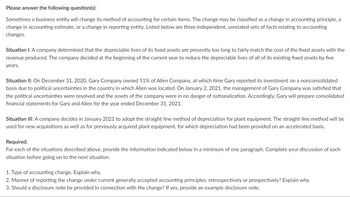
FINANCIAL ACCOUNTING
10th Edition
ISBN: 9781259964947
Author: Libby
Publisher: MCG
expand_more
expand_more
format_list_bulleted
Question

Transcribed Image Text:Please answer the following question(s):
Sometimes a business entity will change its method of accounting for certain items. The change may be classified as a change in accounting principle, a
change in accounting estimate, or a change in reporting entity. Listed below are three independent, unrelated sets of facts relating to accounting
changes.
Situation I: A company determined that the depreciable lives of its fixed assets are presently too long to fairly match the cost of the fixed assets with the
revenue produced. The company decided at the beginning of the current year to reduce the depreciable lives of all of its existing fixed assets by five
years.
Situation II: On December 31, 2020, Gary Company owned 51% of Allen Company, at which time Gary reported its investment on a nonconsolidated
basis due to political uncertainties in the country in which Allen was located. On January 2, 2021, the management of Gary Company was satisfied that
the political uncertainties were resolved and the assets of the company were in no danger of nationalization. Accordingly, Gary will prepare consolidated
financial statements for Gary and Allen for the year ended December 31, 2021.
Situation III: A company decides in January 2021 to adopt the straight-line method of depreciation for plant equipment. The straight-line method will be
used for new acquisitions as well as for previously acquired plant equipment, for which depreciation had been provided on an accelerated basis.
Required:
For each of the situations described above, provide the information indicated below in a minimum of one paragraph. Complete your discussion of each
situation before going on to the next situation.
1. Type of accounting change. Explain why.
2. Manner of reporting the change under current generally accepted accounting principles: retrospectively or prospectively? Explain why.
3. Should a disclosure note be provided in connection with the change? If yes, provide an example disclosure note.
Expert Solution
This question has been solved!
Explore an expertly crafted, step-by-step solution for a thorough understanding of key concepts.
This is a popular solution
Trending nowThis is a popular solution!
Step by stepSolved in 2 steps with 4 images

Knowledge Booster
Learn more about
Need a deep-dive on the concept behind this application? Look no further. Learn more about this topic, accounting and related others by exploring similar questions and additional content below.Similar questions
- Which of the following is not one of the approaches for reporting accounting changes? The change approach. O The retrospective approach. The prospective approach. O All of these answer choices are approaches for reporting accounting changes.arrow_forwardWhich limitation of an income statement occurs when one company uses an accelerated depreciation method while another company uses straight-line depreciation? O Companies omit from the income statement items they cannot measure reliably. O Income measurement involves judgment. O Income numbers are affected by the accounting methods employed. All of these answer choices are correct.arrow_forward
Recommended textbooks for you

 AccountingAccountingISBN:9781337272094Author:WARREN, Carl S., Reeve, James M., Duchac, Jonathan E.Publisher:Cengage Learning,
AccountingAccountingISBN:9781337272094Author:WARREN, Carl S., Reeve, James M., Duchac, Jonathan E.Publisher:Cengage Learning, Accounting Information SystemsAccountingISBN:9781337619202Author:Hall, James A.Publisher:Cengage Learning,
Accounting Information SystemsAccountingISBN:9781337619202Author:Hall, James A.Publisher:Cengage Learning, Horngren's Cost Accounting: A Managerial Emphasis...AccountingISBN:9780134475585Author:Srikant M. Datar, Madhav V. RajanPublisher:PEARSON
Horngren's Cost Accounting: A Managerial Emphasis...AccountingISBN:9780134475585Author:Srikant M. Datar, Madhav V. RajanPublisher:PEARSON Intermediate AccountingAccountingISBN:9781259722660Author:J. David Spiceland, Mark W. Nelson, Wayne M ThomasPublisher:McGraw-Hill Education
Intermediate AccountingAccountingISBN:9781259722660Author:J. David Spiceland, Mark W. Nelson, Wayne M ThomasPublisher:McGraw-Hill Education Financial and Managerial AccountingAccountingISBN:9781259726705Author:John J Wild, Ken W. Shaw, Barbara Chiappetta Fundamental Accounting PrinciplesPublisher:McGraw-Hill Education
Financial and Managerial AccountingAccountingISBN:9781259726705Author:John J Wild, Ken W. Shaw, Barbara Chiappetta Fundamental Accounting PrinciplesPublisher:McGraw-Hill Education


Accounting
Accounting
ISBN:9781337272094
Author:WARREN, Carl S., Reeve, James M., Duchac, Jonathan E.
Publisher:Cengage Learning,

Accounting Information Systems
Accounting
ISBN:9781337619202
Author:Hall, James A.
Publisher:Cengage Learning,

Horngren's Cost Accounting: A Managerial Emphasis...
Accounting
ISBN:9780134475585
Author:Srikant M. Datar, Madhav V. Rajan
Publisher:PEARSON

Intermediate Accounting
Accounting
ISBN:9781259722660
Author:J. David Spiceland, Mark W. Nelson, Wayne M Thomas
Publisher:McGraw-Hill Education

Financial and Managerial Accounting
Accounting
ISBN:9781259726705
Author:John J Wild, Ken W. Shaw, Barbara Chiappetta Fundamental Accounting Principles
Publisher:McGraw-Hill Education